Pakistan’s foreign policy, as envisioned by Abdul Sattar, reflects a complex interplay of geopolitical realities, historical experiences, and national interests. This article delves into the key tenets of Sattar’s approach, examining its relevance in shaping Pakistan’s interactions on the global stage.
Abdul Sattar, a seasoned diplomat and former Foreign Minister of Pakistan, articulated a foreign policy framework grounded in pragmatism, prioritizing national security, economic diplomacy, and regional stability. His tenure, marked by both successes and challenges, offers valuable insights into the intricate dynamics that continue to inform Pakistan’s foreign policy outlook.
Balancing Act: Navigating Regional and Global Powers
Sattar recognized the delicate balancing act required in managing relations with major powers. He advocated for a policy that safeguards Pakistan’s core interests while fostering constructive partnerships. This involved leveraging strategic alliances to enhance national security and advance economic development.
A cornerstone of his approach was maintaining a strong relationship with China, a time-tested ally. Sattar viewed this partnership as pivotal for regional stability and economic growth. Simultaneously, he stressed the need for balanced ties with the United States, recognizing its influence in global affairs.
Emphasizing Economic Diplomacy and Regional Connectivity
 Pakistan's Economic Diplomacy
Pakistan's Economic Diplomacy
Sattar strongly advocated for economic diplomacy as a key pillar of Pakistan’s foreign policy. He envisioned a Pakistan deeply integrated into the global economy, leveraging its strategic location to become a hub for trade and investment.
His vision placed significant emphasis on regional connectivity, promoting initiatives like the Central Asia Regional Economic Cooperation (CAREC) program. Sattar believed that enhanced economic cooperation with neighboring countries would not only boost prosperity but also contribute to regional peace and stability.
Championing Multilateralism and International Cooperation
Sattar firmly believed in the power of multilateralism and actively engaged with international organizations like the United Nations. He saw these platforms as crucial for promoting dialogue, addressing global challenges, and amplifying Pakistan’s voice on critical issues.
He advocated for a rules-based international order, emphasizing the importance of diplomacy and peaceful resolution of disputes. Sattar’s commitment to multilateralism underscored his belief in collective action and shared responsibility in tackling global concerns.
Abdul Sattar’s Enduring Legacy on Pakistan’s Foreign Policy
Abdul Sattar’s contributions to Pakistan’s foreign policy continue to resonate today. His emphasis on pragmatism, economic diplomacy, and regional connectivity remains relevant in navigating the evolving geopolitical landscape.
 Abdul Sattar's Book on Foreign Policy
Abdul Sattar's Book on Foreign Policy
His legacy serves as a reminder of the intricate challenges and opportunities that Pakistan faces in its pursuit of national interests on the world stage. As Pakistan navigates a complex web of regional and global dynamics, Sattar’s insights provide valuable guidance for shaping a foreign policy that safeguards its interests and contributes to a more stable and prosperous future.